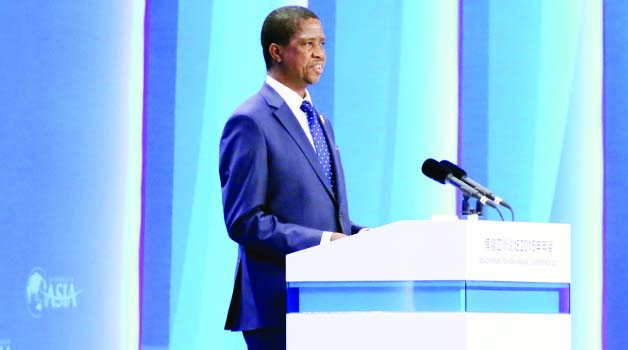By MOFFAT CHAZINGWA in Beijing, China –
PRESIDENT Edgar Lungu has called on Asia to help Africa to move from a least developed continent to the category of middle-income states within the next 50 years as envisaged in its development blueprint, the Agenda 2063.
Mr Lungu said African countries had created various dialogue platforms at continental and sub-regional levels and were preoccupied with fostering economic integration as well as cooperation for their common destiny.
The President said this yesterday in his landmark address to the Boao Forum for Asia (BFA) annual conference 2015 dubbed ‘Asia’s New Future: Towards a Community of Common Destiny’.
President Lungu said African countries were geared to move the continent to another level of social and economic development.
This was possible due to peace and stability that Africa continued to enjoy characterised by democratic transitions, regional integration and high economic growth rates.
“This dialogue among us is built on the firm belief that peace, stability and creating strategic partnerships are key preconditions to sustainable development,” Mr Lungu said.
He said Africa had come up with a new vision for socio-economic transformation called Agenda 2063, which was an approach on how the continent should effectively learn from lessons of the past, build on progress now underway and strategically exploit all possible opportunities available in the immediate and medium-term.
This sought to ensure positive socio-economic transformation within the next 50 years.
“It is our firm conviction that within that 50 years, Africa will move from a predominantly least developed continent to a category of middle-income states,” Mr Lungu said.
It was President Lungu’s conviction that Africa could count on Asia and all strategic partners to assist the continent move forward.
He said it was for this that he, alongside other leaders, were asking for Asia’s alliance as this was one region which defied historical socio-economic difficulties and recorded rapid social economic transformation.
The President was pleased with the theme of the BFA annual conference 2015, saying it was relevant to today’s global dialogue.
This is particularly so given that people were now living in a time and age where the majority of their young generation was characterised by lives of hopelessness.
“This hopelessness can partly be explained by the fact that young people are not certain of what their future holds for them and at the same time they are losing confidence in our global institutions of political and economic governance,” Mr Lungu said.
President Lungu said it had now become a challenge for leaders to chart a future and build global governance institutions which everyone would buy in.
He said this would help to bridge the gap between the young and the old, emphasising that the Boao Forum underscored this value of networking and building synergies across regional and national frontiers to deal with challenges.
In his key note address to the conference, Chinese President Xi Jinping said this year marked a historic juncture to reflect on the past and look to the future.
Mr Xi said with the days of global colonialism and the Cold War long gone, countries were now increasingly interconnected and interdependent.
He said countries were now in a better position to uphold general stability in the world and seek common development.
Ugandan President Yoweri Museveni said the East African Community (EAC) made up of Burundi, Kenya, Rwanda, Tanzania and Uganda was engaged in tripartite negotiations with the Common Market for Eastern and Southern Africa and Southern African Development Community (SADC) to form one trading block.
Presidents Lungu and Museveni are the only two African Heads of State attending the Boao conference which officially opened here yesterday.







